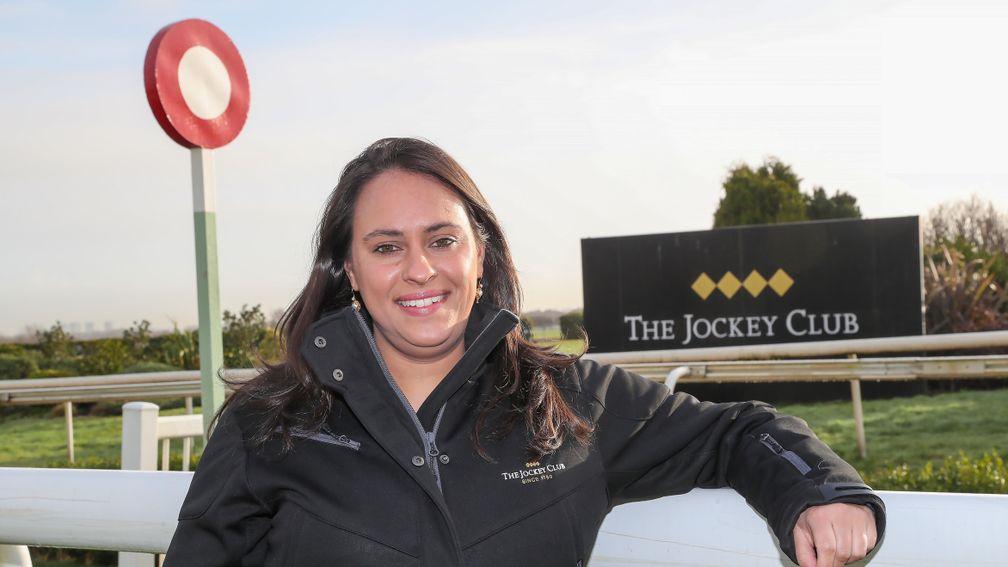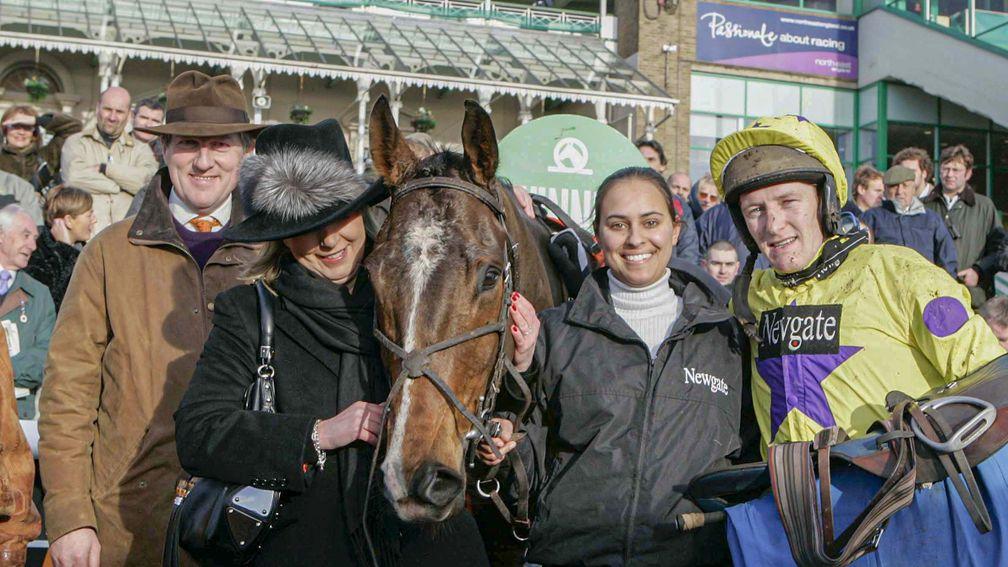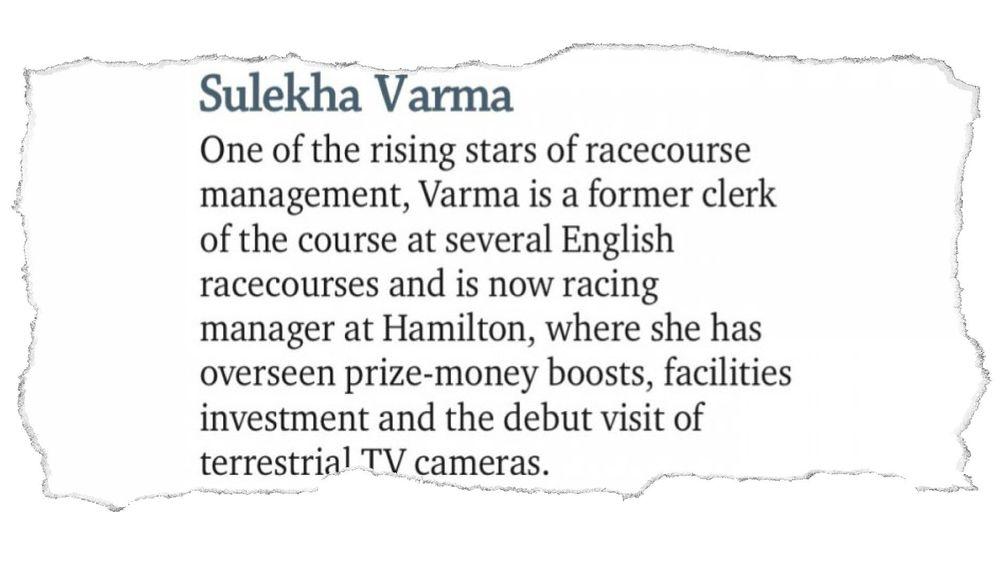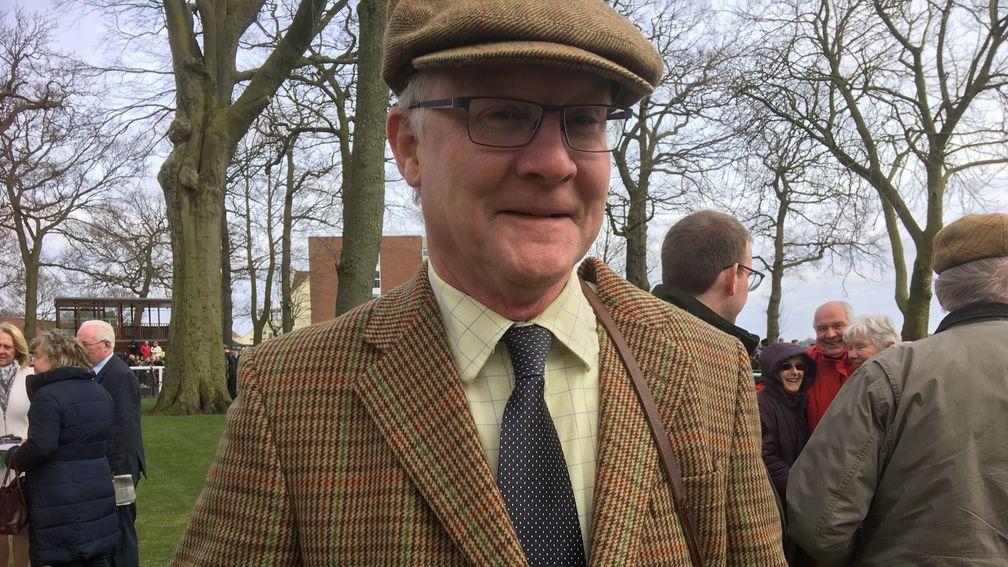'The Grand National is such a huge race and to be leading it is incredible'

The Racing Post's David Carr won Racing Writer of the Year on Thursday. Here, in one of three pieces David submitted to the judging panel, he sat down with Aintree's clerk of the course on the eve of the Grand National weights launch
Something will be different when the great and the good of the jumping world gather in Liverpool for the unveiling of the Grand National weights on Tuesday.
All the usual traditions will be observed: the blasting of the British handicapper by an angry Irish trainer; the explanation of compression of the weights; and the theorising that a 2m4f chaser is just what you need for the longest race in the calendar.
However, those who have not been keeping up with the news will get a shock when the Jockey Club's north-western head of racing and clerk of the course gets up to talk about the track – and is neither middle-aged, white, English nor even male.
Sulekha Varma, 35 and the daughter of an Indian neurosurgeon father, was awarded the keys to the GoingStick cupboard at the home of the world's most famous chase last December.
The difference in appearance and background from her rather more patrician predecessors Andrew Tulloch and Charles Barnett is striking.
So much so that, when the Racing Post caught up with her in her first week in the job, she was looking forward to a visit from The Times – who weren't thought to have been attracted by her views on watering and fence-building.
In an accent that betrays a childhood spent mainly in Scotland, having been born in Cardiff, she's quick to stress: "There will be bigger stories than me on Tuesday!"
But she adds: "I'm not sure being the first woman means a lot to me but it is different, it is a change and I think it means a lot for the industry, for the sport. We've seen strides forward in the diversity of our workforce – look at Delia Bushell at the Jockey Club, Annamarie Phelps at the BHA and our own chairman here in Rose Paterson.
"In the last ten years racecourses have moved towards becoming businesses, run with a more commercial mindset, and with that has come a more diverse workforce because that's how you run a successful business."
Randox Health Grand National entries and betting
The founder member of the BHA's Diversity In Racing Steering Group has come across just "very limited" racism, from "one or two individuals" in her time in the sport.
"This was way back and it was never to my face," she recalls. "I was informed by others that things had been said. But those people who told me it had happened had called it out at the time and said 'that's not acceptable'."
On the front foot
No more acceptable is any backsliding on horse welfare, a huge issue at Aintree as the biggest TV sports audience of the year is occasionally confronted with the grim reality of what can befall its equine athletes.
This is likely one of the many reasons that this key frontline job went to Varma, in whom racing could wish for nobody better to promote racing's welfare record.
She is proactive rather than defensive, and while in her last job at Hamilton she appeared at the Scottish Parliament to address cross-party groups for racing and for animal welfare.
"I believe in our sport," she says passionately. "I'm an animal lover, I rode horses from a young age and I have an affinity with them and I love seeing them compete.
"That's why everybody is involved in racing, because we love horses and respect them as athletes. Aintree is at the forefront of that.
'We need to communicate what we do' – outgoing Aintree clerk Andrew Tulloch issues welfare plea
"But the industry needs to continue to step up. And that's why Aintree needs to continue to innovate, research, develop, discuss and consult. We still need to find a way to tell people what we're doing. As an industry we're going in the right direction and we just have to keep going.
"We need to be telling people how well cared for these horses are. We can't continue to hide and say 'racing's our sport, we'll get on with it'. We have to accept that we need to communicate – we need to let people see we care for these athletes because we love them."
To critics of the changes that have been made to the fences at Aintree, she stresses: "It's still a test – it still requires a horse who can jump. There's a reason we build schooling fences around the country, it's so that trainers can try their horses over them and make sure they take to them. The fences couldn't stay as they were, they were no longer acceptable. What we have now remains a test, but it's a safer test."
Courage of her own convictions
Varma's equine speciality growing up was the intricately demanding discipline of dressage – which is no surprise to those who have been struck by her attention to detail.
"It's a very rewarding sport because you are working so closely with the horse," she says. "It's wonderful. I was never a particularly brave rider so jumping over massive obstacles was never really an option for me!"
Whatever her bravery in the saddle, Varma has never lacked the courage of her own convictions.
She is described as "quite steely" by Fife trainer Lucinda Russell, with whom she spent a week’s work experience while at school and then rejoined as racing secretary.
"I was liaising with owners, farriers and vets and it gave me a superb grounding in the industry at the grassroots," she recalls.
And those with a good memory for faces may have seen her lead up the 83-rated chaser Low Reactor when he won at Newcastle on Fighting Fifth Hurdle day at Newcastle in 2007.

"It was great as it was the only race he won and I’m still in touch with the owners," she adds.
With no wish to become a trainer, Varma grabbed the chance to move to the Arabian Racing Organisation and then trained as a clerk of the course with Jockey Club Racecourses.
"I'd been ambitious from day one," she says. "I was always wanting to move forward to the next right opportunity. I had no ambition to be a trainer – my brain is geared towards the logistical administration side."
First at Market Rasen and Nottingham, then Warwick and Huntingdon, she has never been a clerk to be pushed around and she says: "You have to have the conviction and the ability to defend your decision. Nine times out of ten people are happy with what you do, sometimes they're not. But you have to step back and think, 'it's not personal'."

Opportunity knocked again after four years at Hamilton where she learned more about running a business under recently honoured chief executive Vivien Currie and was nominated in the Racing Post as one of the 35 under 35 to look out for.
Tulloch surprised the racing world by announcing he was leaving Aintree and Varma, who worked at Aintree during the last nine National meetings, recalls: "I got the news as I was sat on a plane about to fly to Gran Canaria so it was rather nice as I could switch off for ten days and think about it," she says.
"The holiday gave me time to think it through. What were the implications. How would my life change if I got the job? Was I happy to do that? And the answer was 'absolutely'. This particular opportunity has only come up every quarter of a century in the last 100 years."
Success means that Varma will be in the spotlight more than ever – it will not just be the Post and The Times wanting to talk to her on April 4 – but she says: "That's part of the draw, the Grand National is such a huge race and to be leading it is incredible. There's pressure but that comes with any job, once you get to this level in any game."
But it could have been very different. Varma might have been writing this piece rather than appearing in it, having worked at the Post on the BHA graduate scheme after her Classical Studies degree at Durham.
"I had an idea that journalism might be what I wanted to do and I had a fantastic six weeks," she remembers. "I learned a huge amount.
"When I finished, the editor Chris Smith said he could offer me part-time work. Unfortunately, living in London that was not an option – had there been a full-time place I'd probably have considered it. But one of my old tutors used to refer to happenstance . . ."
As others see her
Kirkland Tellwright, Haydock clerk of the course
She didn't need a lot of mentoring from me! She's a self-starter and she's very composed under pressure, which is a quality I think will stand her in good stead. The opportunity to flap will definitely arise!

Lucinda Russell, trainer
She learned very quickly and was always very ambitious. As racing secretary she was very efficient and she set up a lot of the computer programmes we still use now.
One day we had flooding, snow and everything and Scu and I were feeding at night. She came round and said, 'I've got some good news, I've just got a job with the Arabian Racing Organisation!'
Being told your racing secretary is leaving when you're up to your knees in snow and water meant it wasn't the best thing to say. I was a bit shocked but said congratulations. She said, 'Scu, I hope you're happy for me', and he went mental and said you can't leave halfway through the season! But the anger only lasted ten minutes.
She's always been someone who was going to be successful whatever she did. She listens but she also has a very good brain for what's right and what's wrong. She's quite steely – if she thinks something is correct she will stick by it.
Read this next:
Aintree clerk Andrew Tulloch to step down after 24 years at the helm
First woman in charge of Grand National after Sulekha Varma named Aintree clerk
Peter Scudamore: unquenchable thirst for winners rewrote the jockeys' manual
Gigginstown 'not playing games' over Tiger Roll's Grand National participation
Members can read the latest exclusive interviews, news analysis and comment available from 6pm daily on racingpost.com
Published on 10 December 2020inInterviews
Last updated 16:52, 10 December 2020
- When Patrick Mullins met Jack Kennedy: 'You could say I've been lucky - they're just broken bones and they heal'
- Richard Hannon: 'When you're dead and buried the only things you're remembered by are your Classic winners'
- Paul Carberry: 'I jumped up on to the rafters. It tended to be all very strait-laced in those days, but I changed that'
- 'We’re like a Sunday League team running in an FA Cup final - we’re taking on the best with an £800 homebred'
- 'Educating myself has let me live a fuller life - just because you've been diagnosed with dyslexia doesn't mean you can't keep working at it'
- When Patrick Mullins met Jack Kennedy: 'You could say I've been lucky - they're just broken bones and they heal'
- Richard Hannon: 'When you're dead and buried the only things you're remembered by are your Classic winners'
- Paul Carberry: 'I jumped up on to the rafters. It tended to be all very strait-laced in those days, but I changed that'
- 'We’re like a Sunday League team running in an FA Cup final - we’re taking on the best with an £800 homebred'
- 'Educating myself has let me live a fuller life - just because you've been diagnosed with dyslexia doesn't mean you can't keep working at it'